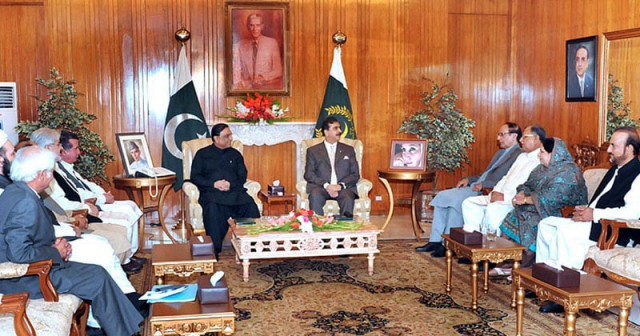Executive stand: Govt consults allies in face of judicial challenge
PPP pre-empts wavering by coalition partners with more ministries; SCBA warns government against disobeying court

Resolving that it will not hand over its legitimate constitutional authority in the face of perceived arm-twisting, the ruling Pakistan Peoples Party (PPP) has sought support of its coalition partners as the latest episode of the judiciary-government standoff unfolds.
President Asif Ali Zardari and Prime Minister Yousaf Raza Gilani had a two-and-a-half-hour long meeting with leaders of coalition parties at the Presidency on Thursday night. The meeting was briefed about the ongoing situation, which has seen the judiciary once again put its foot down in the face of what it terms non-cooperation on the part of the government in high-profile corruption cases.
“The government does not want confrontation with any institution including the judiciary but the executive cannot hand over its powers to any other institution,” a participant of the meeting quoted President Zardari as telling the meeting.
A day after giving a special briefing to the Cabinet, Dr Babar Awan also briefed Thursday’s meeting of coalition parties on the current situation.
“We cannot target the judiciary. We have some compulsions, but we should not allow anyone to interfere in our domain. We need the support of our allies to nullify any attempt to destabilise the democratic government,” a leader who attended the meeting quoted the gathering as being told. However, he said everyone agreed that any confrontation at this juncture will not augur well for the country and its institutions.
To keep its coalition partners interested and on their side, the government will offer new ministries in lieu of ministries that have now been devolved to the provinces, sources said. Under the proposed formula, the new ministries will be created by merging those ministerial departments that have been left with the federation after the devolution process.
(Read: The Devolution Process)
At the moment, a number of ministers have been left without portfolios after the devolution of ministries such as health, education, labour and manpower, local government and minorities.
Chaudhry Shujaat’s Pakistan Muslim League-Quaid (PML-Q) will be the main beneficiary of this new departmental dispensation.
“We were told that this plan will be executed soon after Ramazan,” another participant said.
Chaired by President Asif Ali Zardari and Prime Minister Yousaf Raza Gilani the meeting was attended by Senator Chaudhry Shujaat Hussain, Mian Riaz Hussain Pirzada, Senator Dr Babar Awan, Senator Afrasiab Khattak, Senator Muhammad Zahid Khan, Senator Kalsoom Perveen, Munir Khan Orakzai, MNA, Noor-ul-Haq Qadri, MNA, and Spokesperson for the President Farhatullah Babar. A press release issued after the meeting said the President briefed coalition parties on his recent visits to Iran, Afghanistan and Saudi Arabia.
The meeting also discussed issues relating to power and gas shortage and price hike in the country, it said, adding that the meeting also took stock of the current political and economic situation.
Judicial meeting
While the coalition parties met at the judiciary over what they perceived to be a fresh threat to the government, judges of the Supreme Court stressed that there was no confrontation.
Speaking in a short speech after a farewell dinner arranged in his honour at the Supreme Court, retiring Justice Javed Iqbal said: “We have no other motives. No one should take it wrongly. I want to negate (the impression) that there is any confrontation between state institutions… the crisis is only on TV channels and talk shows.”
Chief Justice Iftikhar Muhammad Chaudhry in his speech also said that “the basic function of judges and Supreme Court is dispensation of justice without any other motive.”
The chief justice also said that an independent and impartial judiciary plays a key role in checking constitutional deviations and ensures that the law is always supreme against the exercise of arbitrary or capricious authority by any state institution or its functionary.
Whether or not there is or will be a confrontation, presidents of different bar councils across the country who attended the reception threw their support behind the courts.
In background interactions with the media office bearers of different bar associations were of the view that the apex court has been showing “unnecessary judicial restraint” so far.
SCBA condemns govt
The Supreme Court Bar Association, on its part, has expressed deep concern over the new set of grievances between the judiciary and executive taking a sinister turn, which could result in destabilising the country.
The SCBA Executive Committee held a meeting at the Supreme Court building on Thursday and unanimously passed a resolution against the government for defying the court’s orders. They warned the government that the bar is considering all options to make it heed to the SC’s orders, including reviving the lawyers’ movement, if the need arises. WITH ADDITIONAL REPORTING BY AZAM KHAN
Published in The Express Tribune, July 29th, 2011.



















COMMENTS
Comments are moderated and generally will be posted if they are on-topic and not abusive.
For more information, please see our Comments FAQ